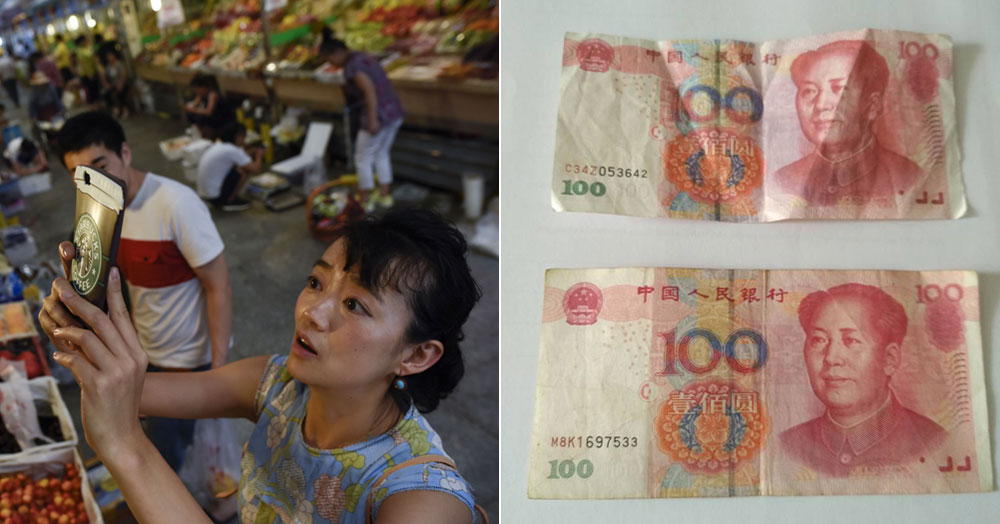If you've been to China recently, you can easily spend the entire day out without your wallet.
All you need is your digital mobile device and you can utilise WeChat and Alipay to complete your e-payment for practically anything that can be bought and sold.
Singapore wants to do it too
The rise of digital payment in China is so common and successful that it is a source of inspiration for Singapore.
In the 2017 National Day Rally, Prime Minister Lee Hsien Loong cited China's advanced e-payment systems as one of the push factors for Singapore's Smart Nation initiative.
PM Lee recounted an embarrassing incident of how former Manpower Minister Lim Swee Say used cash instead of the more common mobile payment for some chestnuts at a roadside stall.
How is China using e-payments
That single example illustrated two points: China's mobile payment is ubiquitous and is light years ahead of the competition.
Be it on the bus...
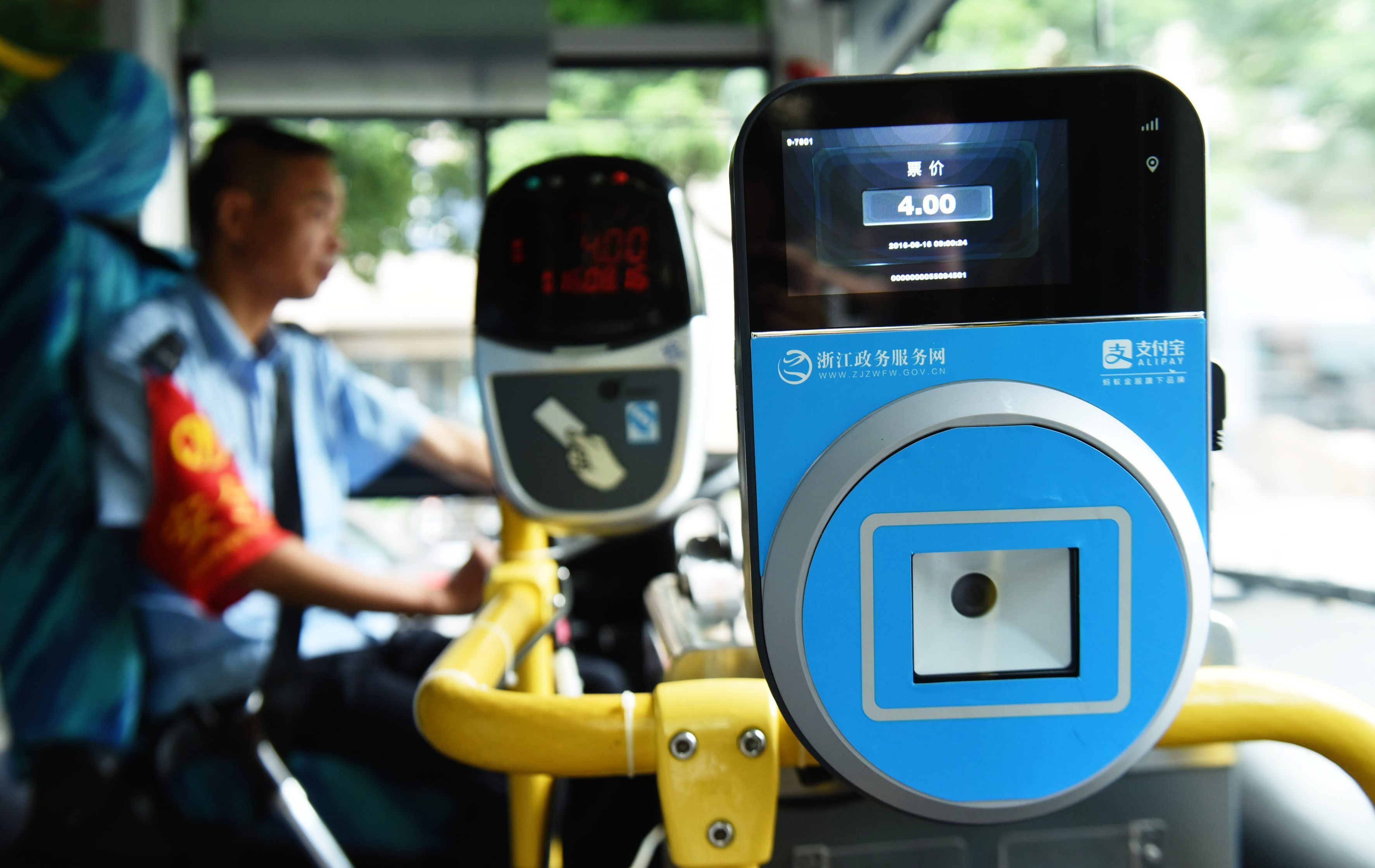 HANGZHOU, CHINA - AUGUST 16: QR code reader that supports Alipay is installed on bus 506 on August 16, 2016 in Hangzhou, Zhejiang Province of China. Alipay gives bus passengers a new choice, reducing inconvenience caused by giving change as people don't prepare change when taking a bus but could pay with Alipay. (Photo by VCG/VCG via Getty Images)
HANGZHOU, CHINA - AUGUST 16: QR code reader that supports Alipay is installed on bus 506 on August 16, 2016 in Hangzhou, Zhejiang Province of China. Alipay gives bus passengers a new choice, reducing inconvenience caused by giving change as people don't prepare change when taking a bus but could pay with Alipay. (Photo by VCG/VCG via Getty Images)
Toll booths...
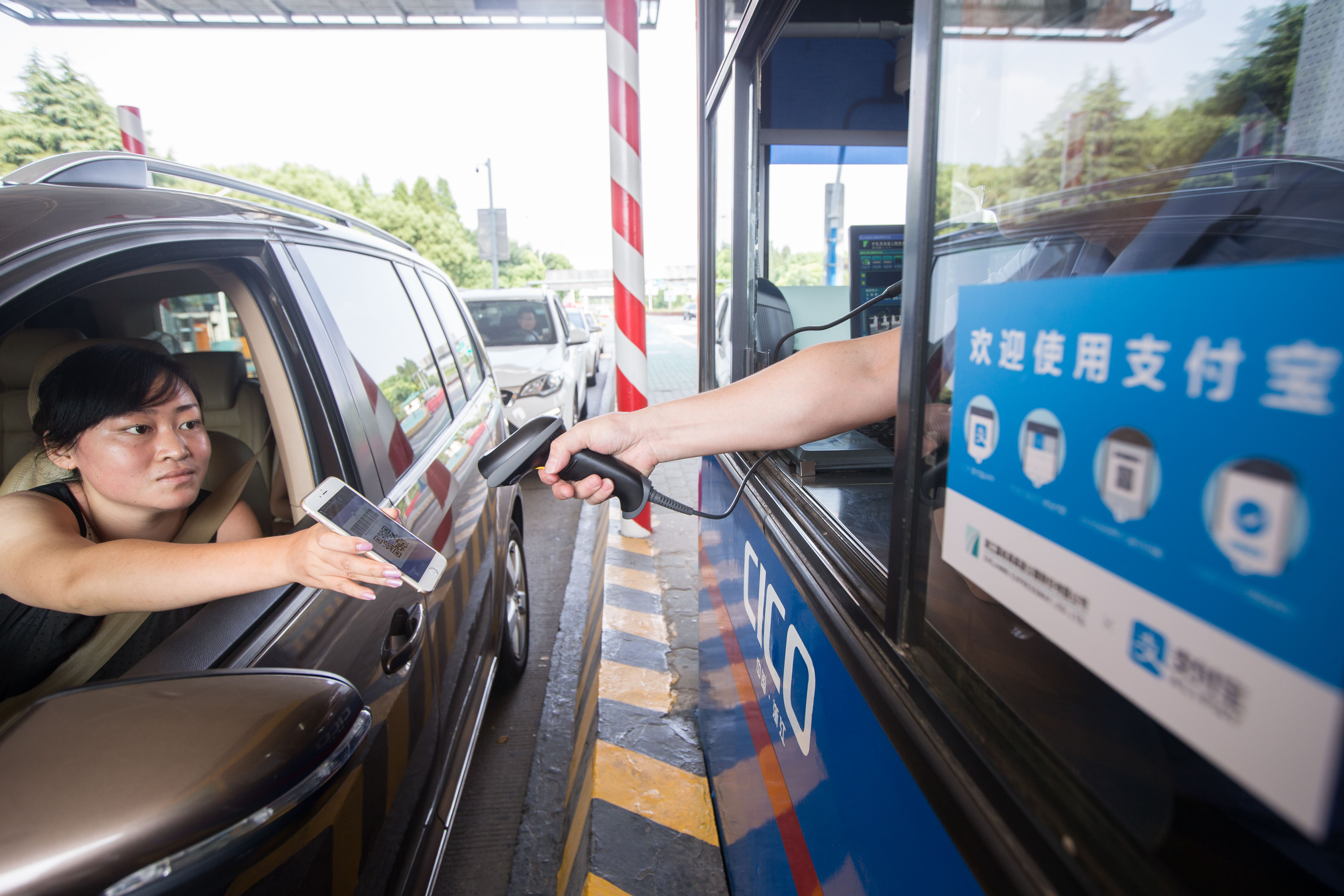 HANGZHOU, CHINA - SEPTEMBER 21: A worker scans a driver's smartphone to charge the highway toll by way of Alipay, an online payment platform of Alibaba Group, at Pengbu toll station of Shanghai-Hangzhou-Ningbo Expressway on September 21, 2016 in Hangzhou, China. The Pengbu toll station is the first freeway toll station equipped with Alipay payment function in China. (Photo by VCG/VCG via Getty Images)
HANGZHOU, CHINA - SEPTEMBER 21: A worker scans a driver's smartphone to charge the highway toll by way of Alipay, an online payment platform of Alibaba Group, at Pengbu toll station of Shanghai-Hangzhou-Ningbo Expressway on September 21, 2016 in Hangzhou, China. The Pengbu toll station is the first freeway toll station equipped with Alipay payment function in China. (Photo by VCG/VCG via Getty Images)
Or even the market...
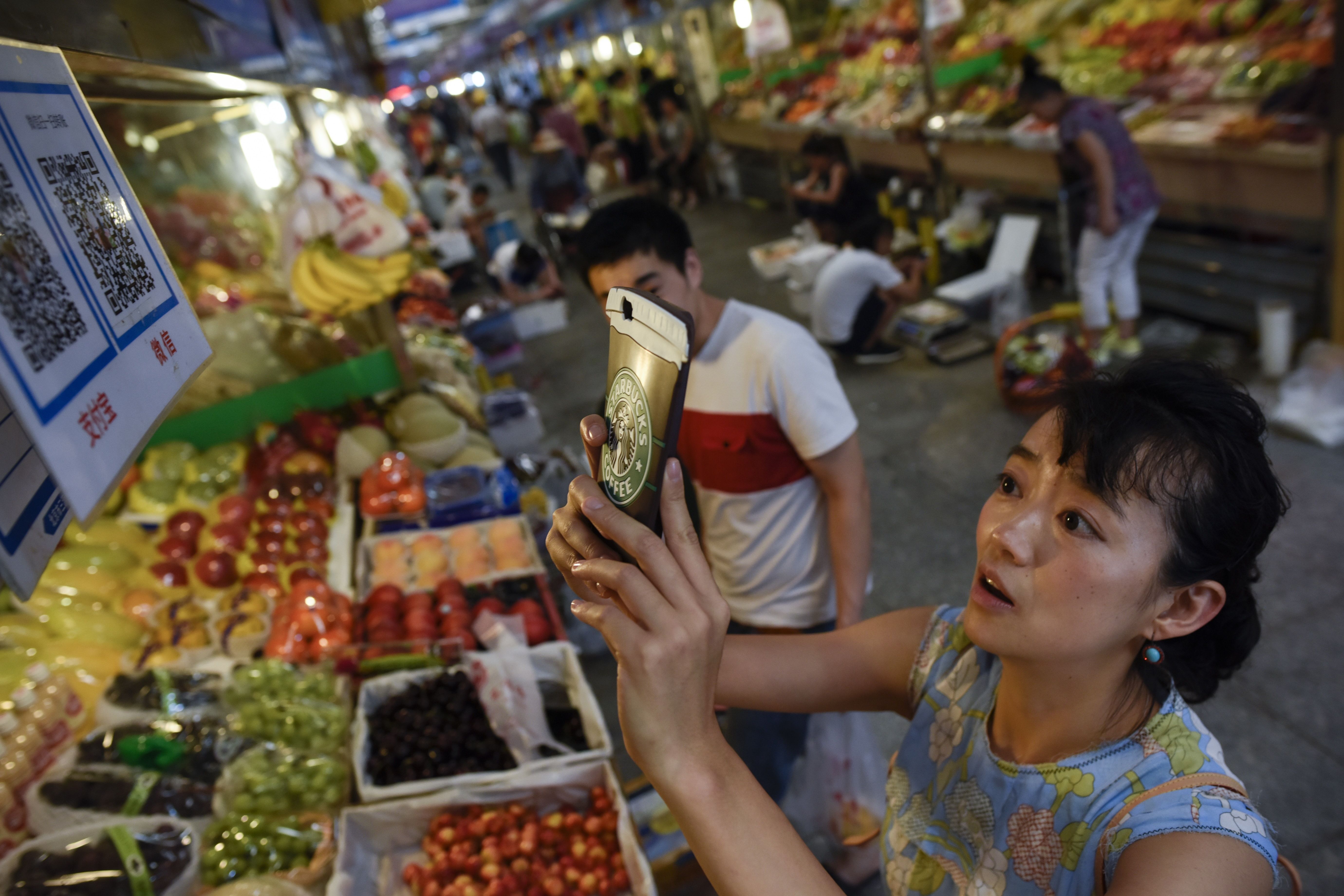 This photo taken on June 27, 2017 shows a woman making purchases by scanning QR codes using her smartphone at a fruit stall in a market in Beijing.
This photo taken on June 27, 2017 shows a woman making purchases by scanning QR codes using her smartphone at a fruit stall in a market in Beijing.
China was the first country in the world to use paper money but centuries later the soaring popularity of mobile payment has some analysts forecasting it could be the first to stop. / AFP PHOTO / WANG ZHAO / TO GO WITH China economy internet, FOCUS by Allison JACKSON (Photo credit should read WANG ZHAO/AFP/Getty Images)
E-payment has become king.
More than just tech
However, there is slightly more to this story than meets the eye.
Now, the easiest narrative to follow is one where technological advancement is made possible as a result of summoning human and political will necessary to implement such an ambitious system in such a vast country, and in effect, making the lives of the commoners more convenient, and arguably, better.
But this narrative is probably not the most complete -- or pragmatic enough.
For policymakers at the highest echelons of government to make a substantial push for digital payments, a much urgent and compelling justification is necessary.
One rather obvious push factor that is seldom mentioned: The fight against counterfeit bills in China.
Fake everything in China
Go back 10 years in time and you would probably remember seeing counterfeit bill detectors at many cashiers in China.
Holding up a renminbi to UV light or rubbing Chairman Mao's forehead or collar to see whether it's real, was, in fact, a way of life in China.
Counterfeit bills were so rampant it could be found everywhere. Some even claimed they were dispensed from real ATMs.
According to the South China Morning Post, the face value of seized counterfeit money in China rose from 329 million yuan to 532 million yuan in 2014.
It was serious enough for the government to issue a new 100 yuan bill, designed to combat counterfeiting, just a year later.
Can you tell?
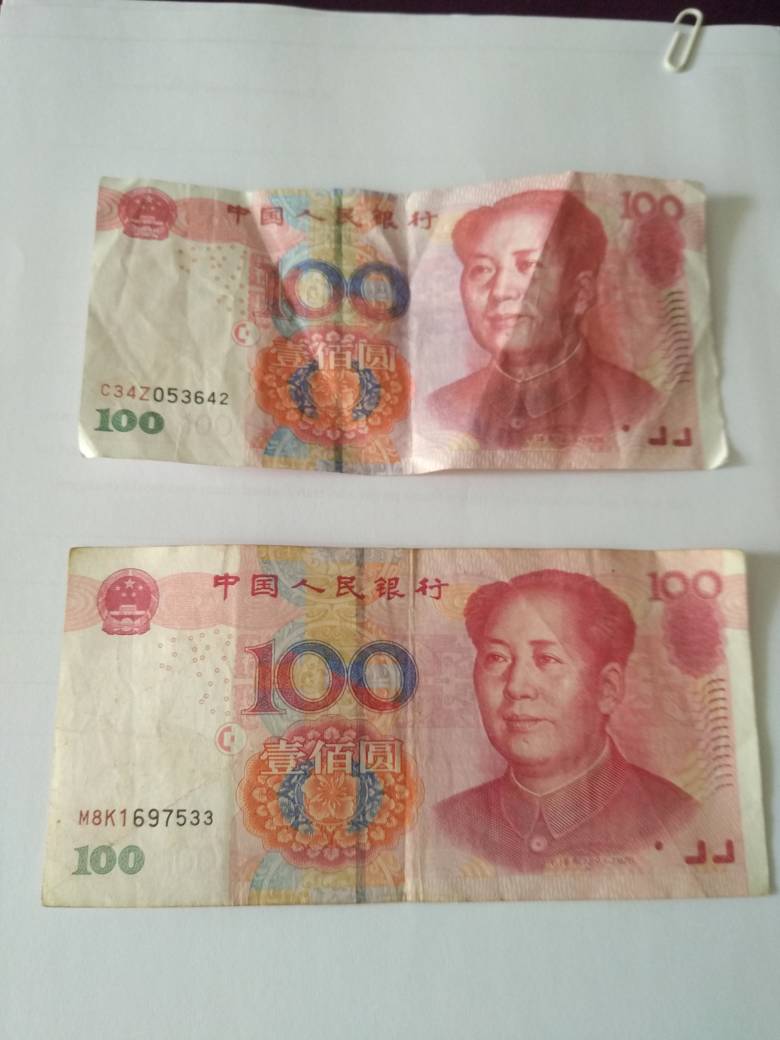 Top is fake.
Top is fake.
But for a country that is known to fake anything from Apple stores to milk powder, to even banks and an entire government, nothing is quite as impossible to duplicate.
Fake currency is par for the course for the bootleggers who make good money off making fake money.
Even two years after the introduction of the new bill, Chinese police still manged to seize counterfeit notes worth a record 214 million yuan face value in one single raid.
Great for illegal syndicates, bad for small businesses
Forging currency is good money for the perpetrators.
According to the officer in charge of the raid, a fake 100 yuan bill sells for 6 yuan, up from 2 to 3 yuan just three years ago.
Yes, inflation happens in the world of fake notes too. It's big business for these illegal syndicates.
For small time retailers, however, receiving a fake 100 yuan for a 20 yuan snack makes bad business. And it can also be inconvenient because businesses are left holding on to fake notes.
That's why there is the preference for mobile payments even in wet markets.
Or, in Lim Swee Say's case, a chestnut roadside stall.
[related_story]
That's why, these days, the only way to combat counterfeits is to have no physical bills in circulation.
Which is also why the push for digital payments as a means to fight a much more persistent, existing problem, makes a hell lot of sense for the Chinese government.
And hopefully, for Singaporeans to understand as well, that the development of e-payments in China was real and urgent because the scourge of fake money could have become too big a problem to bear -- which is not an issue Singapore is grappling with in the first place.
An exclusive deal for Mothership readers:
If you like what you read, follow us on Facebook, Instagram, Twitter and Telegram to get the latest updates.
